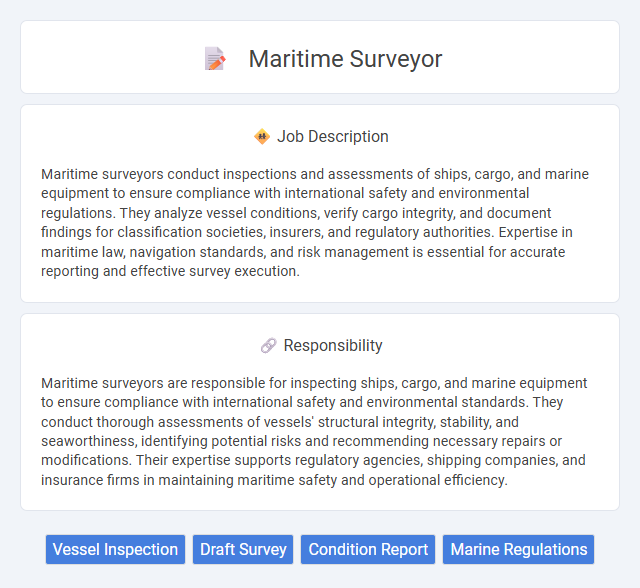
Maritime surveyors conduct inspections and assessments of ships, cargo, and marine equipment to ensure compliance with international safety and environmental regulations. They analyze vessel conditions, verify cargo integrity, and document findings for classification societies, insurers, and regulatory authorities. Expertise in maritime law, navigation standards, and risk management is essential for accurate reporting and effective survey execution.
Individuals with strong analytical skills and attention to detail are likely suitable for a Maritime Surveyor role, given the job's demand for accurate inspections and assessments. Candidates comfortable with spending time at sea and working in varied weather conditions probably adapt well to the physical aspects of this occupation. Those with a risk-averse mindset and capacity to handle stressful situations may find this job aligns with their personal and professional strengths.
Qualification
Maritime Surveyors require a strong foundation in marine engineering, naval architecture, or maritime studies, typically holding a bachelor's degree in these fields. Professional certifications such as the International Institute of Marine Surveying (IIMS) certification or equivalent are highly valued, ensuring expertise in ship inspection, safety compliance, and cargo condition assessment. Practical experience onboard vessels or within marine inspection companies enhances proficiency in evaluating ship conditions, regulatory adherence, and damage investigation.
Responsibility
Maritime surveyors are responsible for inspecting ships, cargo, and marine equipment to ensure compliance with international safety and environmental standards. They conduct thorough assessments of vessels' structural integrity, stability, and seaworthiness, identifying potential risks and recommending necessary repairs or modifications. Their expertise supports regulatory agencies, shipping companies, and insurance firms in maintaining maritime safety and operational efficiency.
Benefit
The role of a Maritime Surveyor likely offers significant benefits, including competitive compensation and opportunities for global travel, which may enhance professional experience and cultural exposure. There is a strong probability that maritime surveyors gain specialized skills in ship inspection, cargo assessment, and regulatory compliance, leading to promising career advancement. Furthermore, job security may be relatively high due to the consistent need for safety and quality assurance in maritime operations.
Challenge
Maritime surveyor roles probably involve complex challenges due to the need for precise inspection of vessels and equipment in diverse and often harsh marine environments. Navigating regulatory compliance and ensuring safety standards might require continuous adaptation to evolving maritime laws and technology. The job likely demands a keen eye for detail and strong problem-solving skills to address potential risks and discrepancies effectively.
Career Advancement
Maritime surveyors play a critical role in inspecting ships and ensuring compliance with international maritime regulations. Career advancement in this field often involves gaining certifications such as the International Maritime Organization (IMO) standards and specialized training in areas like cargo surveys or environmental assessments. Experienced maritime surveyors can progress to senior technical roles, consultancy positions, or managerial roles within classification societies and shipping companies.
Key Terms
Vessel Inspection
A Maritime Surveyor specializing in vessel inspection conducts thorough assessments of ships to ensure compliance with international safety and environmental regulations such as SOLAS and MARPOL. Their expertise includes checking hull integrity, machinery condition, safety equipment, and cargo handling systems to identify defects or risks that could compromise seaworthiness. Detailed inspection reports generated by surveyors support shipowners, insurers, and regulatory bodies in maintaining operational standards and preventing maritime accidents.
Draft Survey
A Maritime Surveyor specializing in Draft Survey conducts precise measurements of a vessel's draft to determine cargo weight and ensure safe load distribution. This role requires expertise in hydrostatic calculations, understanding of ship stability, and proficiency with onboard measurement tools to verify cargo quantities accurately. Accurate draft surveys are critical for compliance with maritime regulations and preventing overloading, which enhances vessel safety and operational efficiency.
Condition Report
A Maritime Surveyor specializes in inspecting ships, cargo, and marine equipment to ensure compliance with safety standards and regulations. The Condition Report they produce offers a detailed assessment of a vessel's structural integrity, machinery performance, and overall seaworthiness, crucial for insurance and operational decisions. Accurate condition reports help prevent maritime risks and support maintenance planning, preserving asset value and safety at sea.
Marine Regulations
A Maritime Surveyor ensures compliance with international and national marine regulations, including SOLAS, MARPOL, and ISM codes, by conducting thorough inspections and certifications of vessels. They evaluate ship structures, equipment, and safety systems to guarantee adherence to environmental and safety standards set by organizations such as the International Maritime Organization (IMO). Their expertise supports maritime safety, pollution prevention, and legal compliance critical to global shipping operations.
 kuljobs.com
kuljobs.com